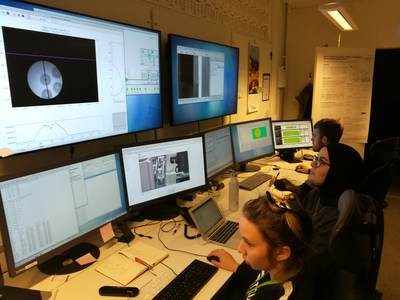Laboratory work, seminar, written lab report.
SK1105 Experimental Physics 4.0 credits

Information per course offering
Choose semester and course offering to see current information and more about the course, such as course syllabus, study period, and application information.
Information for Spring 2026 Start 16 Mar 2026 programme students
- Course location
AlbaNova
- Duration
- 16 Mar 2026 - 1 Jun 2026
- Periods
Spring 2026: P4 (4 hp)
- Pace of study
25%
- Application code
60777
- Form of study
Normal Daytime
- Language of instruction
Swedish
- Course memo
- Course memo is not published
- Number of places
Places are not limited
- Target group
- CTFYS åk 1
- Planned modular schedule
- [object Object]
- Schedule
Contact
Course syllabus as PDF
Please note: all information from the Course syllabus is available on this page in an accessible format.
Course syllabus SK1105 (Spring 2025–)Content and learning outcomes
Course contents
Intended learning outcomes
After passing the course, the student must be able to:
- design and carry out physical experiments and analyze measurement uncertainties.
- report results orally and in writing.
- describe the situation of diversity and inclusion in physics
Literature and preparations
Specific prerequisites
Active participation in SK1104 Classical Physics.
Literature
Examination and completion
Grading scale
Examination
- RED1 - Presentation, 2.0 credits, grading scale: P, F
- RED2 - Presentation, 2.0 credits, grading scale: P, F
Based on recommendation from KTH’s coordinator for disabilities, the examiner will decide how to adapt an examination for students with documented disability.
The examiner may apply another examination format when re-examining individual students.
If the course is discontinued, students may request to be examined during the following two academic years.
Other requirements for final grade
To pass the course, both oral presentation and written report must be approved.
Examiner
Ethical approach
- All members of a group are responsible for the group's work.
- In any assessment, every student shall honestly disclose any help received and sources used.
- In an oral assessment, every student shall be able to present and answer questions about the entire assignment and solution.